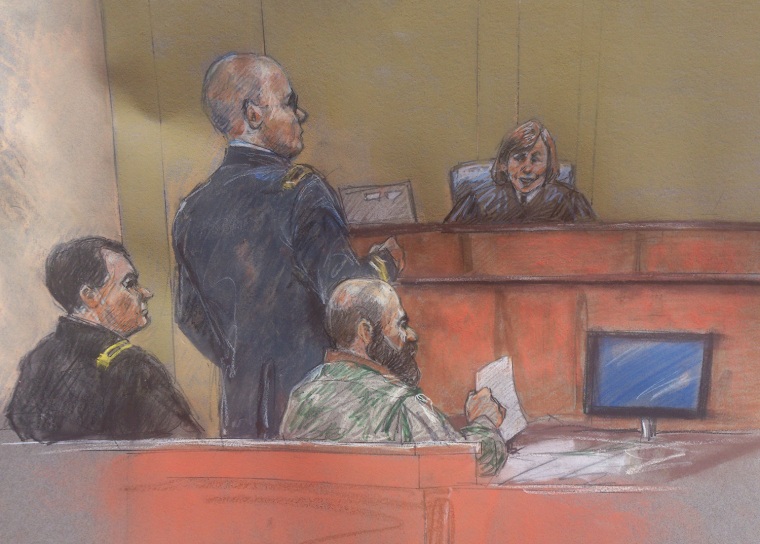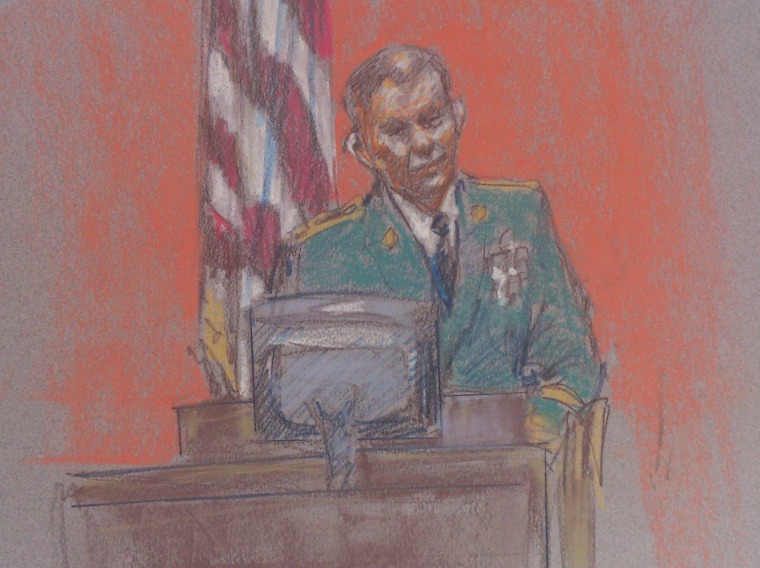Nearly four years after the deadliest attack at a U.S. military installation, Army soldiers testified about the day that changed their lives forever in Fort Hood, Texas.
"There were a lot of bodies on the ground. The chairs were overturned, a lot of blood on the floor. It smelled like gunpowder, feces, blood. Pretty bad," said Staff Sgt. Michael Davis, who thought the gunfire was a drill until "I saw somebody get hit, I saw a blood spray," Reuters reported.
Soldiers recalled the searing pain of bullets ripping through their skin on Nov. 5, 2009. They described playing dead to avoid being injured further and making futile efforts to save their friends.
Army psychiatrist Maj. Nidal Malik Hasan is accused of opening fire at them, meticulously planning an attack on anyone in uniform on that day. On Thursday, Hasan — who is serving as his own attorney after twice dismissing his court-appointed legal team — chose not to cross-examine any of his fellow soldiers on the witness stand. Instead, he remained silent in the wheelchair he has been confined to since a civilian police officer shot him after the rampage, leaving him paralyzed from the waist down.
Hasan, an American-born Muslim, said in a brief opening statement Tuesday that "evidence will clearly show" he was responsible for the massacre, in which 13 soldiers were killed and 32 wounded.
Prosecutors did not bring terrorism charges against him.
The first witness on Thursday, a retired major, testified that she tried to help several victims.
"There was intermittent gunfire, there were people screaming," Maj. Laura Suttinger testified, according to Reuters. "There was a short period of silence, and that's when somebody said 'Get out of here!'"
After taking cover, she surveyed the bloody scene and was able to rush over to a victim who had been shot in the leg.
Another witness, Alan Carroll, testified that he told his friend, Pfc. Aaron Nemelka, to get off his chair and hit the ground. But Nemelka didn't move, as if he were in shock, Carroll said, reported Reuters.
"I grabbed his legs and pulled him down to the floor. I was telling him to get on the ground and act like he's dead," Carroll said. "I told him he has a chance - he needs to roll over, put his head on the ground and hold his breath."
Nemelka was shot in the neck while still sitting down and died.
Retired Maj. Laura Suttinger also rushed over to a victim, who had been shot in the leg. She said of the Soldier Readiness Preparedness Center, where the massacre took place, "There was extensive blood all over the place."
Earlier in the day, the military judge in the case ruled Hasan can still represent himself, even though his standby defense team has said he was "encouraging" the death penalty.
The team demanded they be removed from the trial Thursday, insisting the judge was forcing them to violate professional rules of conduct.

On Wednesday, Lt. Col. Kris Poppe, Hasan's standby attorney, told Judge Col. Tara Osborn he was willing to be Hasan's attorney but it was "clear his goal is to remove impediments or obstacles to the death penalty and is working toward a death penalty."
In response, Hasan said: "I object. That's a twist of the facts."
The judge called an early recess for the remainder of Wednesday to consider a motion by Hasan's standby defense team to reduce its role.
On Thursday, Osborn sided with Hasan, saying it was clear this was nothing more than the standby attorneys disagreeing with Hasan's defense strategy.
The standby team is in place to ensure Hasan's case is handled properly while he acts as his own lawyer. The team was ordered Thursday to continue assisting Hasan.
The team said it would appeal the ruling. Poppe called what he was being asked to do "morally repugnant," reported Reuters.
"This is not about saving my license, this is not about protecting my ability to practice professionally in the future,'' Poppe said. "This is about what you are requiring me to do today, which you are saying I am to assist this man in achieving his goal, which we have identified as achieving the death sentence.''
The prosecutor in the case, Col. Michael Mulligan, defended Hasan's strategy on Thursday, saying it would have been "absurd" to contest the facts of what happened on the day of the rampage, reported The Associated Press.
Hasan wasn't disputing the facts, but rather was explaining why they occurred, Mulligan said, calling it a "tried and true" defense strategy, according to the AP.
"I'm really perplexed as to how it's caused such a moral dilemma," Mulligan said.
He faces a panel of 13 senior Army officers — including nine colonels, three lieutenant colonels, and one major. If convicted, he could get the death penalty.
NBC's Deborah Strauss contributed to this report. Reuters and The Associated Press also contributed.
Related content:
